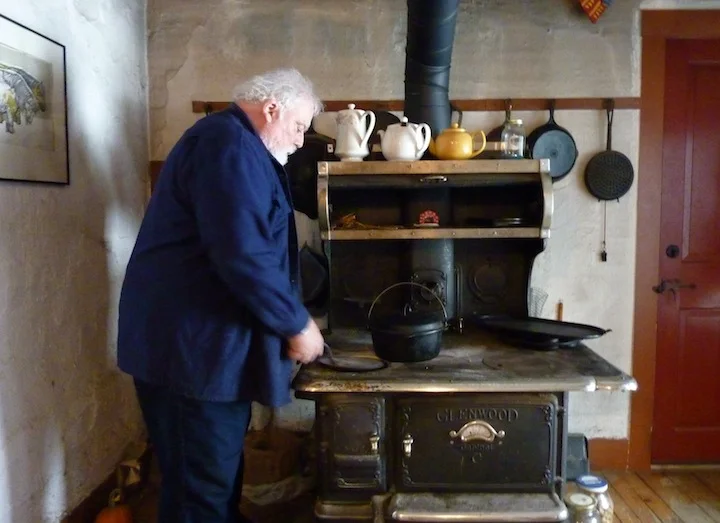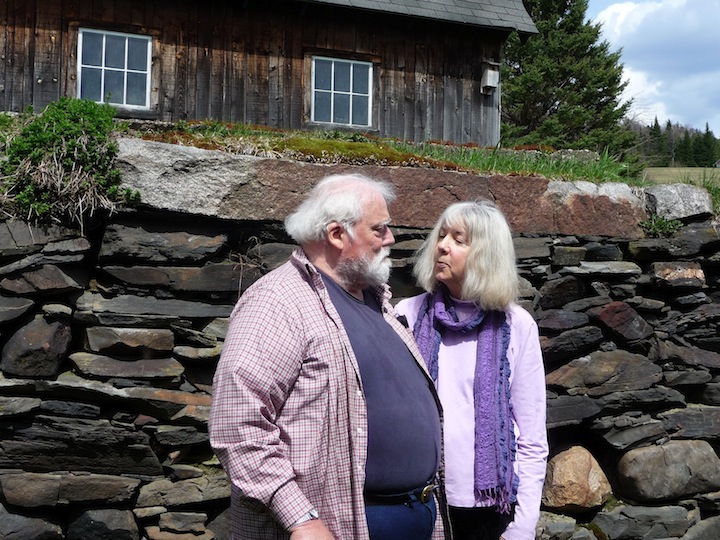In the spring of 1995, Burt Porter agreed to do a favor for one of his neighbors in Glover. During a winter storm, the neighbor's mailbox had blown over. So Burt offered to share his own mailbox and pick up mail for both of them until the fallen post got back on its feet.
The neighbor had a subscription to The New York Review of Books. Burt had been teaching English for thirty years, and was himself a poet and musician, so he decided to thumb through the Review. In the back pages, he came across a list of personal ads, and since he had been single for a while, he looked through those as well.
At that time, my dear friend Lindsay Knowlton was the director of Financial Aid for the School of Law at Boston University. She'd had the job for many years, and appreciated her colleagues and the students and the excellent health and retirement benefits. But the job could be long hours, and she had two vocations entirely unrelated to her day job: birding and writing poetry.
She, too, was single, and had happened to place a personal ad in the issue of TNYRB that Burt had picked up for his friend.
When Burt saw her ad, he got in touch. A few weeks later, Lindsay went on a birding trip in New Hampshire and continued the drive all the way up to Glover. It was Father's Day, and Burt was celebrating with his sons and his sons' partners and various family members and friends, some of whom lived on Burt's land.
"I was charmed immediately," Lindsay told me afterward. And when the guests left, Burt and Lindsay found out they had a lot to talk about.
Four days after Lindsay returned to Boston, she suffered a massive stroke. For the first twenty-four hours, it wasn't clear if she would make it. Lindsay had mentioned Burt Porter to her sister, but without saying where he lived in Vermont. So her sister called 411, reached a sympathetic operator, and told her the whole story. Together they went through all the possible B. Porter's in Vermont, until they tracked down Burt's number.
He arrived at Lindsay's hospital room within the week. Over the next six months, he continued to make the trip back and forth from Glover to Boston, while Lindsay worked on her recovery, which was a long and grueling and often disheartening. By the end of the summer, it became clear that memory loss and vision impairment would make it impossible for her to return to her job at Boston University. Lindsay and Burt had spent only one afternoon together before the stroke, but that had been enough.
So when Burt asked her what she wanted to do next, she answered, "Move to Vermont and live with you."
In the fall of 1995, she joined Burt and Burt's son and his son's girlfriend and a bunch of chickens and two oxen and a variety of other animals and birds and neighbors and family members who came and went in the house and garden and surrounding fields on the sixty acres in Glover.
*
Lindsay's recovery was far from complete.
"When Lindsay got here," says Burt. "She was still wacked." They are telling me this story in the kitchen of their house, where a big wood-fueled cooking stove radiates heat and keeps a pot of soup warm.
"One time," says Lindsay, "I was trying to tell Burt a story about a friend of mine who is a big birder and loves loons especially. My friend had spotted a pair of loons on a pond, right about the same time a red fox had spotted the same pair. So my friend got to watch as the fox slipped into the water to go after the birds. But the loons just kept diving longer and deeper until they eventually drowned the fox.
"It was a good story," she says. "The problem was, I couldn't remember the word 'fox.'"
Burt laughs. "She kept saying, 'Oh, you know, that giant orange bird with little tips of black on its ears.'" He holds his hands up on either side of his head and makes fox ears. "It was like in the Wizard of Oz. She fell asleep in Boston and woke up in Vermont with some old guy she barely knew."
At that point, Lindsay had already attended the MFA Writing Program at Goddard College and later received her degree from Warren Wilson College. She had also received a fellowship from the Massachusetts Artists Foundation, been funded by the Massachusetts Council for the Arts and Humanities, and twice been a Fellow at the MacDowell Colony. She had published widely and been a finalist in a number of prestigious manuscript competitions.
But she couldn't remember the name of the giant orange bird with black tips on its ears.
Slowly, surrounded by the landscape and people and animals and life of a small town in northern Vermont, Lindsay returned to words and the natural world. In many ways, it was an ideal setting for her. She felt at home in the old house in the country. She had grown up in rural Massachusetts in the second oldest house in New England, built in 1636, and she had been a birder and naturalist all her adult life.
Still, after sixteen years, she's mindful of native Vermonters' reluctance to allow flatlanders to claim full citizenship. "I never call myself a Vermont poet," she says. But her poems are filled with the language and images of the world in which she recovered the names of things: the sighting of a bobcat or the slow collapse of an abandoned barn. She recently published a poem about the burial of the last of Burt's pair of oxen, Nip and Tuck:
Ritual for a Red Ox
"That was the last of them then," I thought
when up on the hill, I heard the knell of backhoe brakes
and looked down at the pasture to see Erik's
telltale rig digging out the grave.
We had buried Tuck a year before,
and now it would be an aged Nip.
Lately it seemed he'd been readying himself:
after peacefully grazing-- instead of the usual way
of lowering himself down on his knees to sleep,
he would just flop down
and roll on his side like a horse,
as if angling for a looser life
or playing dead. But this time
he meant it--this time was for real.
I thought "smart ox to go early in spring before
the black flies worry your poor spent hide."
And after Erik, with backhoe and chains, had dragged Nip
into position and slowly lowered him into the grave,
as we had done before with Tuck,
we all gathered in a circle and joined hands;
and just as Lucinda had shown us with Tuck,
we tossed hay in to foster his oxen dignity
until only one long horn poked through. Then
Burt read his poem about the year
quickly turning and the oxen kneeling in prayer
"to what mild God an ox might think is there."
With final solemnity he cast the book
into the grave and Erik leveled out the dirt.
And the field grew up
lush and green and barren.
Last year she published her own first collection, Earthly Freight, with iUniverse, because, to my mind, thought she had been a finalist in a number of competitions, none of the traditional publishers had the wit to recognize the Wordsworthian dignity and glory in these poems. I should hasten to add that is not what Lindsay would say. In truth, it doesn't much matter how she gets published or what she calls herself. She makes poetry of what she sees and hears, finding language fine enough for the natural world.
If Lindsay's poems are those of the sharp-eyed naturalist, Burt's are those of the musician and storyteller. He almost always writes in forms, often sonnets. Even the longer narrative poems use blank verse, the stately, five-beat, unrhymed lines of Wordsworth and Frost.
Musical talent runs in his family. Burt began playing mandolin when he was six, accompanied by his mother on the piano and his father on the mandolin. Eventually, Burt inherited the fiddle that had been made for his great grandfather in Aberdeen, Scotland, in 1873.
Burt also writes songs and ballads of his own. Whenever we visit, we get him to play for us. I'm especially fond of the Yeats poems he has set to music. This evening, after we eat, as light dies in the window behind him, he takes his mandolin out of the case and plays a song he wrote about listening to his father play the mandolin, when Burt himself was a small child.
Songs softly gleaming
Like gold in the evening,
Songs that would fade
In the twilight's last glow...
As the day fades and the house fills with music, there is an eerie, pleasantly disorienting sense of timelessness. We are here in Glover in 2011, and there in his childhood home in 1951.
Burt grew up in rural Connecticut, but by the time he graduated from college, the area around his hometown had gotten too crowded for him. He looked for work in northern Vermont and found a job teaching English at the Lyndon Institute in Lyndonville, where he taught for forty years, eventually becoming chair of the English Department. He's always had animals on his land, chickens and dogs and, for twenty years, the pair of Red Devon oxen, Nip and Tuck, that Lindsay has immortalized.
Burt has published four books of poetry, including A Spiral Wind and Rhymes of the Magical World. He plays fiddle and mandolin throughout the area, and also calls for square dances. In the warm kitchen, which smells of soup and homemade bread, he continues to play the mandolin and sing one of the Yeats poems I love. Behind him, the big window reveals red-winged blackbirds, grackles, evening grosbeaks, and the usual sparrows and nuthatches, feasting on the feed that Burt and Lindsay scatter along the porch railing.
In addition to writing poems and playing music, Burt travels the state giving talks sponsored by The Vermont Humanities Council. One of his favorite subjects is the traditional fiddle music of New England. He has developed a few theories about how and why this music sounds the way it does, with its regular rhythms and complex melodies. He doesn't claim to be a scholar.
"This is just stuff I've come up with over the years," he says, as he explains his theories to me. "It made sense to me when I thought of it."
He believes the repertoire was shaped, in part, by our native Yankee love for order. Indeed, when Burt takes out his fiddle and plays the New England version of the waltz "Crossing to Ireland," the plangent notes and echoing repetitions seem to rise up out of the evening, out of the surrounding farms with their neat barns and gardens and fields and pens, out of the Vermont landscape.
No matter how random and serendipitous the details of their story might sound, every time I visit them, I have a sense that out of all my friends, it is Lindsay and Burt who have ended up exactly where they are supposed to be.
<img alt="P1010491_3.JPG" src="http://www.michelleblakewriter.com/news/images/P1010491_3.JPG" width="720" height="540" class="mt-image-center" style="text-align: center; display: block; margin: 0 auto 20px;" />

